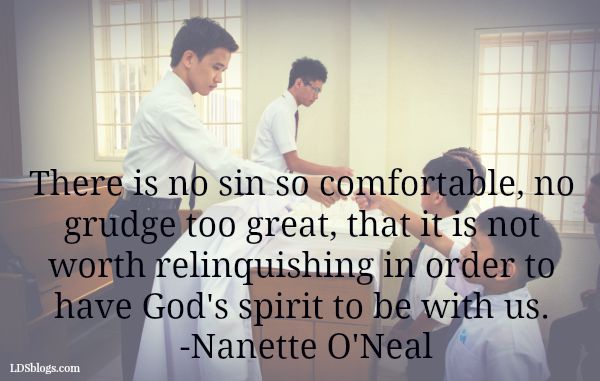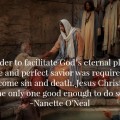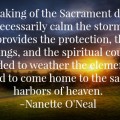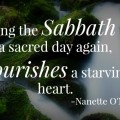“The Altar—what we relinquish, what we receive”
Have you ever been dissatisfied with a store purchase enough to return it? Imagine you buy a new appliance and it isn’t working like you thought. You are faced with the decision—live with it or take it back. You decide to take it back and the person at the custom service counter is very understanding. He agrees you should not live with such an item, and you indeed deserve better. He offers you a new item which is perfect. It’s exactly what you need to make your life easier. You are ecstatic. But instead, you leave with the old item.
Unbelievable? Not entirely. We may be doing this every Sunday if we fail to lay our problems on the altar and take up the perfect gift Christ offers us.
What happens at the altar?
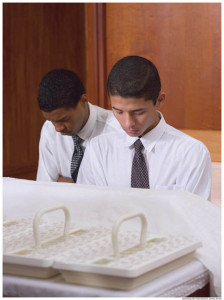 The altar has been a place of sacrifice since the days of Adam and Eve. Adam was first instructed to make an offering of the best of his flock. The unblemished lamb represented the sacrifice of our Savior, Jesus Christ. Christ laid down his life for us so that we, too, could overcome sin and death. Since the administering of the first Sacrament during the Last Supper and each Sunday thereafter, the altar is used to remember our Savior’s sacrifice so that we may be forgiven of our sins. But the altar is also a place where we can make an exchange—our defective selves for a more perfect model. In other words, we leave our sins behind and receive His gift of the Atonement.
The altar has been a place of sacrifice since the days of Adam and Eve. Adam was first instructed to make an offering of the best of his flock. The unblemished lamb represented the sacrifice of our Savior, Jesus Christ. Christ laid down his life for us so that we, too, could overcome sin and death. Since the administering of the first Sacrament during the Last Supper and each Sunday thereafter, the altar is used to remember our Savior’s sacrifice so that we may be forgiven of our sins. But the altar is also a place where we can make an exchange—our defective selves for a more perfect model. In other words, we leave our sins behind and receive His gift of the Atonement.
I have often watched what goes on at the altar on Sunday where the sacrament is broken and blessed. During the worship service, the priests stand behind the altar—a table where trays of bread and water, covered by a white linen sheet, are placed. While the sacrament hymn is sung, the priests uncover the trays and begin to tear the bread in preparation for the blessing and passing of the Sacrament. I drift in my mind’s eye to the night in Gethsemane when Christ suffered for our sins and afflictions, where he bled from every pore. I then think of the agony he felt before and during the crucifixion the next day, where his body was broken by the severe beatings he took, the nailing of his hands and feet to the cross, and the sword that pierced his side. As the priests tear the bread, the symbolic representation is obvious—they do it in remembrance of the sacrifice Christ made for us.
When the priests are finished, one will kneel behind the altar and offer the sacrament prayer, spoken reverently and precisely. “Oh God, the Eternal Father, we ask thee in the name of Thy Son, Jesus Christ, to bless and sanctify this bread to the souls of all those who partake of it, that they may eat in remembrance of the body of Thy Son and witness unto Thee, oh God, the Eternal Father, that they are willing to take upon them the name of Thy Son, and always remember Him, and keep His commandments which He has given them that they may always have His spirit to be with them. Amen.” The bread is passed for all to partake.
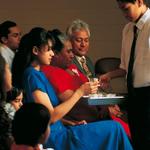 The water is then blessed in like manner with a similar prayer. It is passed for all to drink. We thus take in physical objects, bread and water, to represent the spiritual gift of eternal life given to us by our loving Savior.
The water is then blessed in like manner with a similar prayer. It is passed for all to drink. We thus take in physical objects, bread and water, to represent the spiritual gift of eternal life given to us by our loving Savior.
What do we leave at the altar?
In essence, we come to Sacrament meeting with a faulty appliance—our broken heart. We carry grudges, guilt, sin, low self-esteem—the list of troubles is unique to each of us. We trust that the Lord will take our problems and make us whole again. We figuratively step up to the altar and offer our defective selves in exchange for the purifying powers the Savior has gifted to us. It is a simple exchange—we lay our faults on the altar and pick up His perfection—and for a moment we are made perfectly clean again. The cleansing that comes from partaking of the Sacrament is like getting a reboot for the week, a chance to start fresh, renewed, free of sin. While Satan will almost immediately bombard us again with his temptations, we need not worry. We can return in seven days to unload our burden and to take upon us Christ’s name and have His spirit to be with us.
The problem arises when we won’t let go of our broken selves. Have you ever had a grudge so delightful to bear; you didn’t want to part with it? One that you’ve held for years, became acquainted with intimately, crafted in great detail, until it became a part of you? Those are the faults that seem too difficult to relinquish. They require a lot of will power on the part of the holder of the grudge—to leave it on the altar and walk away.
Walk away with something better
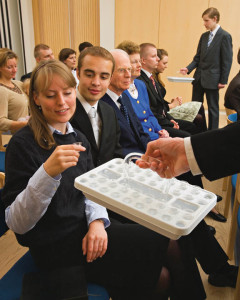 There was a time when I held bitter feelings toward a member of the congregation for crimes he committed against another. I was counseled by my Bishop (the head clergyman in my church) that to hold these feelings would send me over the proverbial cliff along with the sinner. A talk given by James E. Faust, then a member of the First Presidency of the church, had the perfect solution for me. It was directed toward people like me, who had a difficult time forgiving. He counseled in this manner. If a person had troubles with laying their grudges on the altar, then put them aside for now—allow the Savior to carry them. Then focus your energy on Him—His life, His teachings, His love for you. Gain strength from your acquaintance with Him until you are ready to forgive. Let Him heal you first and you will be able to face your burdens with His strength to guide you. I took this advice and learned to walk away with something better.
There was a time when I held bitter feelings toward a member of the congregation for crimes he committed against another. I was counseled by my Bishop (the head clergyman in my church) that to hold these feelings would send me over the proverbial cliff along with the sinner. A talk given by James E. Faust, then a member of the First Presidency of the church, had the perfect solution for me. It was directed toward people like me, who had a difficult time forgiving. He counseled in this manner. If a person had troubles with laying their grudges on the altar, then put them aside for now—allow the Savior to carry them. Then focus your energy on Him—His life, His teachings, His love for you. Gain strength from your acquaintance with Him until you are ready to forgive. Let Him heal you first and you will be able to face your burdens with His strength to guide you. I took this advice and learned to walk away with something better.
Satan will try to tempt you—but in seven days you can visit the altar again.
Being fully cleansed takes time. We must allow time to convince our hearts to develop a new habit—that of leaving our sins at the altar. While we may feel the gift of the Atonement cleanse us on Sunday, trials of the heart may set us back during the week. It’s not a set-back. It’s part of the healing process. The more often we unburden ourselves and lay our greatest sins on the altar, the more He blesses us with strength to resist retrieving them again.
In a recent article by JeaNette Goates Smith, “When We Don’t Need to Forgive,” from Meridian Magazine, August 3rd 2015, she talks about forgiveness being described with two different words. She states, “If we had different words for the two types of forgiveness, the scripture that reads “I, the Lord, will forgive whom I will forgive, but of you it is required to forgive all men,” could read, “I, the Lord, will absolve whom I will absolve, but of you it is required to relinquish bitter feelings towards all men.” When the Lord forgives, he absolves, when men forgive, they relinquish.”
It’s a slow process, learning to lay our burdens on the alter and to leave them there, but it is one that guarantees eternal happiness. Let’s remember this—what we take with us from the altar will strengthen our spirit and prepare us for eternity. When we receive the sacrament we remember the body and blood of Jesus Christ—his sacrifice for us. We witness unto God, the Eternal Father, that we are willing to take upon us the name of his Son. In other words, we tell God we are willing to stand with Christ in word and deed. We promise to always remember Him and keep His commandments—by trying our best to lay our sins aside for Him. Christ in turn promises that we will have His spirit to be with us.
There is no sin so comfortable, no grudge too great that it is not worth relinquishing in order to have His spirit to be with us.
About Nanette ONeal
Nanette O'Neal loves the gospel and is very happy to share her testimony on LDS Blogs. She is a convert to the church and still feels the spirit burn strong within her heart. She graduated from Mason Gross School of the Arts with a degree in music education and has taught children and adults in the private and public sphere for over twenty years. Nanette continues to study the gospel and the art of writing. She writes weekly inspirational articles on her blog and is currently working on an LDS fantasy novel series, A Doorway Back to Forever. You can find her at NanetteONeal.blogspot.com. Nanette has a wonderful husband, talented son, and three beautiful dogs.

